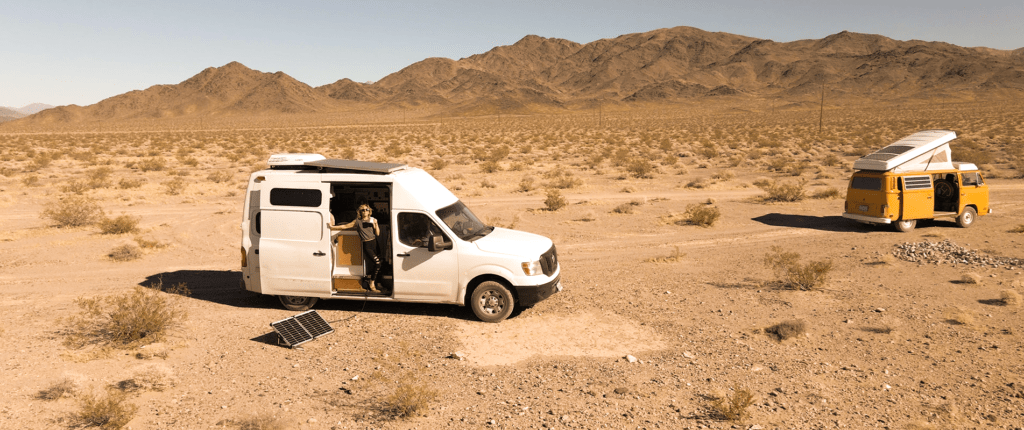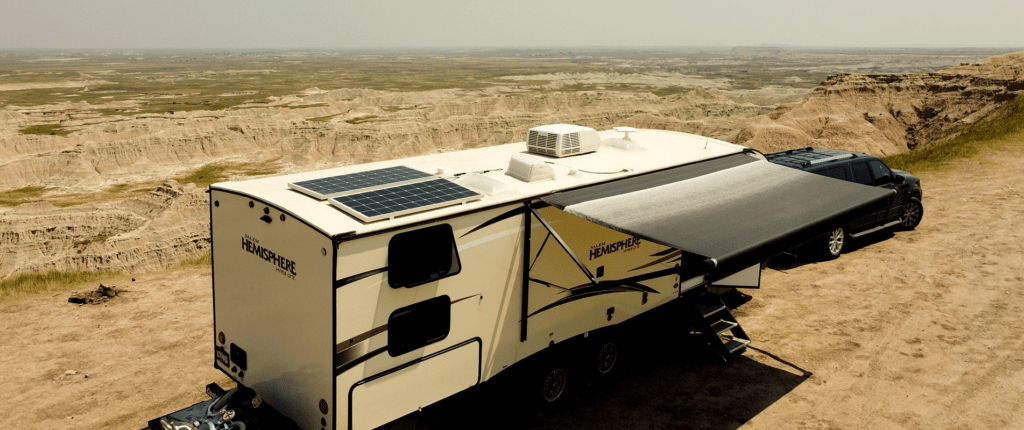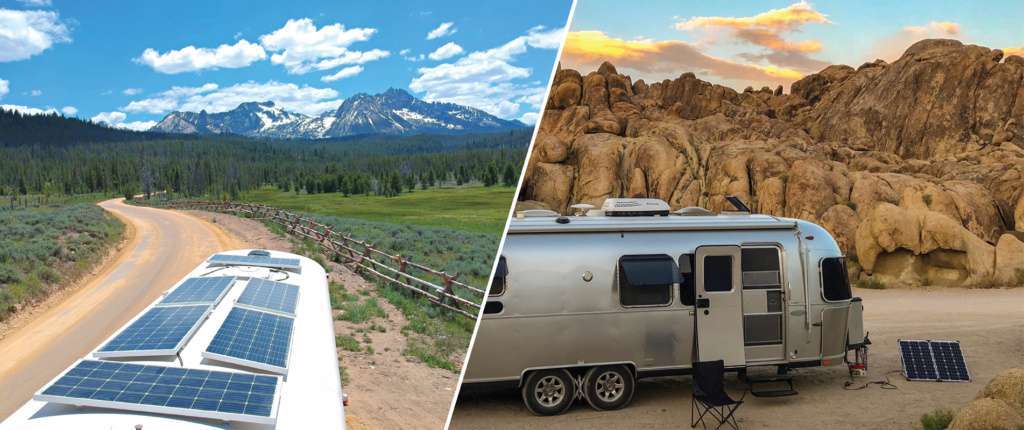Portable vs Fixed Solar
Portable vs Rooftop Solar – there’s never been a better time to invest in solar power for an RV or travel trailer. With so many people venturing farther off-grid for extended periods instead of searching for scarce campsites with power, RV solar is more popular than ever. At the same time, RVers are bringing along more appliances and personal devices, creating unprecedented power demands on their off-grid systems.
For operators looking to add solar, the real question is, “how do you determine which solar solution is right for you?” While traditional fixed-roof solar panels are more durable and user-friendly than ever, emerging portable solutions offer flexibility and a reduced cost of entry.
Let’s go through a few of the features and drawbacks of each type of solar kit.
The Benefits of Portable RV Systems

![]() Portable solar systems are optimized for size and weight. This type of panel isn’t roof-mounted — instead, it’s stored in the RV and only deployed when the camper is parked. Portable panels come in several forms, from small ‘suitcase’ units to larger units that are standalone or hung from the RV.
Portable solar systems are optimized for size and weight. This type of panel isn’t roof-mounted — instead, it’s stored in the RV and only deployed when the camper is parked. Portable panels come in several forms, from small ‘suitcase’ units to larger units that are standalone or hung from the RV.
The reduced footprint of portable solar systems offers several advantages:
Flexibility. With portable systems, operators don’t have to park their RVs in a location that optimizes the sunlight on their rooftop panels. Instead, they can park in the shade or in a spot that affords the most scenic views — all while charging the RV’s batteries with a portable panel placed in the sun.
Optimizing sunlight. Portable means just that: easy to move. This means the portable panels can be moved throughout the day to maximize their exposure to the sun, keeping the best possible charge coming in.
Ease of use. Using portable panels means no drilling holes, mounting panels on the roof, or running cables through the RV. You can also move the panel from one RV to another without much hassle, should you choose to upgrade.
Cost. While portable panels can be more expensive than their rooftop counterparts, they can be cheaper once installation costs are factored in.
A great introduction to solar. RV owners who aren’t ready to install a fixed solution can begin reaping the benefits of solar with an entry-level portable solar kit. As requirements change, you can expand your portable system or use it as a supplementary charging source should you choose to go fixed.
For Some, Fixed-Roof Solar Solutions Are Still Tops

![]() While portable systems have many positives, they aren’t ideal for every RVer. In some cases, traditional rooftop systems may be a better fit:
While portable systems have many positives, they aren’t ideal for every RVer. In some cases, traditional rooftop systems may be a better fit:
Storage. With space at a premium in RVs and travel trailers, consider that portable panels must be stowed safely when not in use. As power requirements (and the number of panels) grow, storage can become more challenging.
Set up. RVers looking to simplify campsite set up may prefer the convenience of fixed-panel rooftop solutions. Portable systems require setup and tear down at each location, adding time and work to every stop.
Mobile charging. RVers with fixed solar systems can enjoy charging their batteries anytime it’s light out — even while traveling! Portable systems don’t offer the same convenience and can only be used when RVs are parked.
Scalability. It’s easier to accommodate more power with fixed systems. Many RVs and trailers can have up to 1,000 watts of solar panels on their roof, but most wouldn’t want to set out and store the equivalent number of portable panels.
Security. Fixed rooftop panels are relatively safe. Portable panels can be dropped, knocked over, or even stolen if left unattended.
Selecting the Optimal RV Solar Solution

Choosing between portable and fixed RV solar systems (or even a hybrid solution) requires some homework. Factors you’ll need to consider are current and future power requirements and, of course, budget. However, the first step is understanding how and where you camp:
![]() Weekend campers. While portable systems can’t usually match the performance of fixed solutions, they should meet the requirements of RVers who only need solar capabilities for a few days at a time.
Weekend campers. While portable systems can’t usually match the performance of fixed solutions, they should meet the requirements of RVers who only need solar capabilities for a few days at a time.
![]() Full-time road warriors. Operators who regularly overnight in parking lots or rest areas often choose fixed solar solutions for security. Adventurous RVers who prefer remote locations may opt for portable systems if power requirements aren’t too extreme.
Full-time road warriors. Operators who regularly overnight in parking lots or rest areas often choose fixed solar solutions for security. Adventurous RVers who prefer remote locations may opt for portable systems if power requirements aren’t too extreme.
![]() ‘Power users.’ RVers who want all the conveniences of home will likely need to opt for a robust rooftop solar installation. These types of campers are not often able to meet power needs with even the best portable systems. However, these campers can benefit from a smaller rooftop system supplemented by a portable panel to boost charging power when required.
‘Power users.’ RVers who want all the conveniences of home will likely need to opt for a robust rooftop solar installation. These types of campers are not often able to meet power needs with even the best portable systems. However, these campers can benefit from a smaller rooftop system supplemented by a portable panel to boost charging power when required.
Asking the Experts
 Some RVers may be uncertain which type of solar system — fixed or portable — is right for them. Luckily, expert help is readily available. A solar-certified RV dealer can help quantify your power requirements, recommend a solar solution tailored to your specific needs, and get you powered up and on the road.
Some RVers may be uncertain which type of solar system — fixed or portable — is right for them. Luckily, expert help is readily available. A solar-certified RV dealer can help quantify your power requirements, recommend a solar solution tailored to your specific needs, and get you powered up and on the road.
Shop for Solar
Go Power! offers a complete line of small, medium, and large-scale solar solutions. Use one of the buttons below to explore our solar kits.
Portable KitsRooftop Kits
